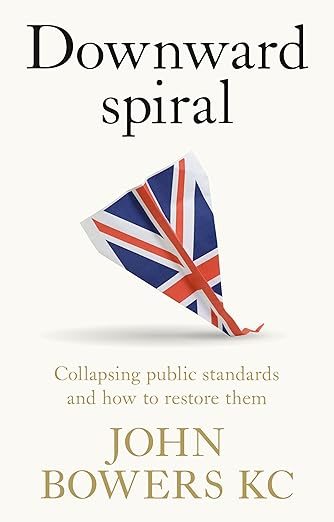Downward Spiral is a book which defies categories. Eminent KC John Bowers has written a four-in-one: a trenchant, wry contemporary history of ethical failures in the UK governmental sphere, a polemic for regulation to protect the British Constitution from abuse, and a philippic on recent former prime ministers. In this election year, it’s also an eloquent manifesto for specific reforms.
For anyone disturbed by events in the UK government arena in recent years, Bowers’ book is cathartic; even therapeutic. It is like listening as a wise and well-informed observer expresses their exasperation and anger at the last decade of UK politics. And despite his tour of past scandals, including the Marconi affair and more recent outrages, he doesn’t sink into his chair with a sigh of “it was always thus”. He actually proposes practical solutions.
 ❱ Downward Spiral: Collapsing Public Standards and How to Restore Them
❱ Downward Spiral: Collapsing Public Standards and How to Restore Them
❱ John Bowers KC
❱ Manchester University Press
Bowers has a clear set of recommendations. One is establishing a single Ethics Commission to consolidate and streamline the regulation of government standards, while maintaining existing bodies under an overarching commission to avoid duplicate investigations. The Advisory Committee on Business Appointments should be, he says, transformed into a body with enforcement powers, including the ability to impose fines and conduct investigations. A new Public Appointments Commission could oversee all public appointments with reduced ministerial involvement, requiring ministers to justify any rejections to a select committee. The role of the independent adviser on ministers' interests should be strengthened with statutory powers and greater independence, requiring parliamentary approval for appointments and dismissals. Additionally, Bowers calls for a comprehensive review of standards, advocating a cultural shift towards greater integrity and accountability, emphasising leadership by example and reducing incentives for unethical behaviour.
So, what will the reaction be to these proposals? I am deeply sceptical that anyone ever really believed that relying on “good chaps” was enough, even in the era of starched collars and top hats. I suspect that many of the system’s insiders found the “good chaps” model expedient. The most egregious outrages, when revealed, could be surgically addressed, allowing the convenient flexibility of the status quo to remain untreated.
But like all western democracies, we live under the rule of law and natural justice. Laws and constitutions are needed to deter those incentivised to do the wrong thing, and they both require segregation of duties, distinct accountabilities, and meaningful consequences when these are breached or fail.
Many other sectors are regulated: financial services, healthcare, pharmaceuticals, aviation and many others. Their histories show that effective regulation requires truly independent (but pragmatic and capable) regulators; clear, fair and transparent processes of investigation and enforcement; and penalties that deter. Through this, professional cultures are created where people understand and adhere to the rules. That is how well-regulated sectors work. This does not mean there will be no ethical failures, but they will be better addressed if these basic components are in place. Effective regulatory systems deter and detect bad actors rather than assuming that “good chaps” will prevail.
The UK political system has a sense of complacency and exceptionalism in its ethical regulation, based around a level of self-regulation that would not be tolerated in the private sector. This may have been convenient for some, just as insider trading was for corporate bad actors of a previous era. Let’s stop being surprised that these abuses occur. Let’s follow Bowers’ advice and design these types of abuse out of our constitutional system.
"I closed Bowers’ book with his metaphor burned in my mind: the Palace of Westminster’s basements and wall cavities mean it is a rodent’s bite away from conflagration"
In an opinion piece summarising his recommendations, Bowers used an apt analogy comparing the state of our ethical regulation to the parlous state of the Palace of Westminster. I closed Bowers’ book with his metaphor burned in my mind.
The Palace of Westminster’s basements and wall cavities mean it is a rodent’s bite away from conflagration. But it is apparently more convenient for our parliamentarians to remain in it than move out while proper repairs are done. At least our parliamentarians know that work is needed, even if they are content to have it done around them (for many years and at much extra expense). Bowers’ book is a powerful manifesto for the “restoration and renewal” of our regulatory estate. It is even more necessary than restoring the physical one.
Rupert McNeil was the government’s chief people officer until 2022. He currently lives and works in Riyadh